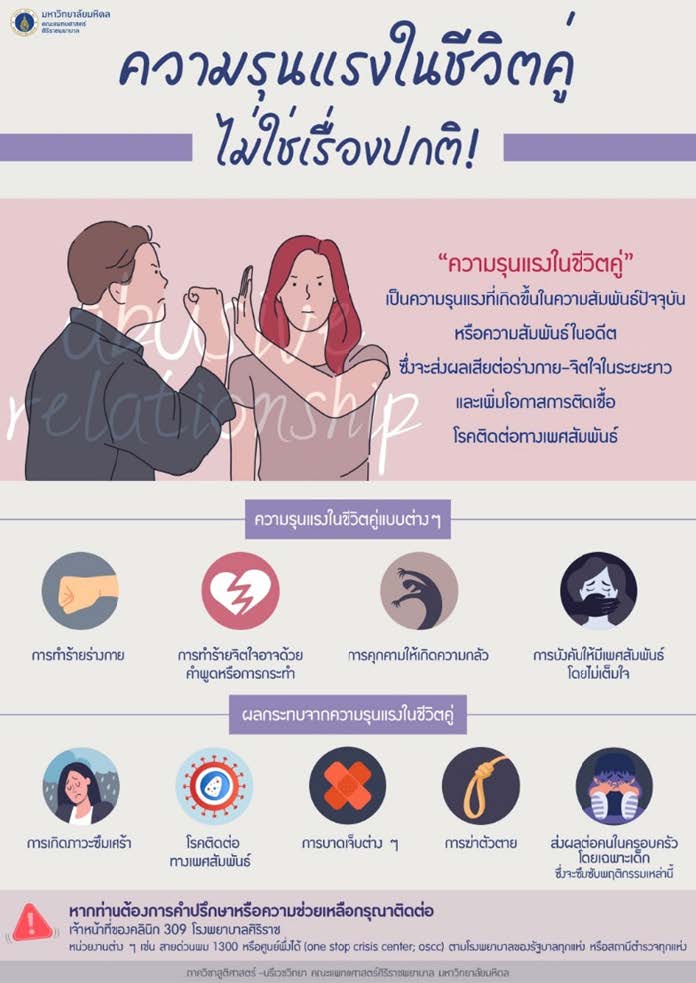Service for Alleviating Intimate Partner Violence at the Siriraj Female STD Clinic
Main Article Content
Abstract
Intimate partner violence (IPV) is a form of family violence, which is a common condition and has long-term effects on the victims and their family members. IPV harms women’s health in both physical and mental aspects. Also, IPV relates to adverse sexual health, including unprotected intercourse, extramarital relationship, unplanned pregnancy, induced abortion and higher chance of having sexually transmitted infections (STIs). A survey at the Siriraj Female Sexually Transmitted Diseases Clinic was done by using two sets of screening tools: the Ongoing Abuse Screen (OAS) and Partner Violence Screen (PVS). The results showed that 39% of the clients were facing IPV. They were more common in women older than 20 years old, those who have been diagnosed with STIs for less than 12 months, those who started their latest partnership for less than or equal to 36 months. However, none of them sought for help or even contacted the Clinic. The most common abnormalities were non-specific vaginitis, genital herpes and pelvic inflammatory disease. IPV screening and developing clinical pathway for clients facing IPV were necessary to increase their quality of life. The practice guidelines recommend IPV screening and raising awareness of the fundamental right that all persons should not be subjected to violence. Multidisciplinary care, including doctor-in-charge, psychiatrist and social workers, plays pivotal roles in alleviating the problem. Moreover, many organizations have worked harmoniously to terminate the violence by providing easy access to assistance, legal act and long-term care. The Unit of Gynaecologic Infectious Diseases and Female STDs, Department of Obstetrics and Gynaecology has collaborated with the Department of Psychiatry and the Siriraj Social Welfare to provide effective services for the clients.
Article Details

This work is licensed under a Creative Commons Attribution-NonCommercial-NoDerivatives 4.0 International License.
References
United Nations. Declaration on the elimination of violence against women. 1993; Available from: https://www.un.org/en/genocideprevention/documents/atrocity-crimes/Doc.21_declaration%20elimination%20vaw.pdf. (Accessed 11 July 2022.)
World Health Organization. Violence against women Prevalence Estimates, 2018. Global, regional and national prevalence estimates for intimate partner violence against women and global and regional prevalence estimates for non-partner sexual violence against women [Internet]. 2021. Available from: https://www.who.int/news-room/fact-sheets/detail/violence-against-women. (Accessed 11 July 2022.)
สำนักงานสถิติแห่งชาติ ประเทศไทย. โครงการสำรวจสถานการณ์เด็กและสตรีในประเทศไทย พศ. 2562. รายงานผลฉบับสมบูรณ์ [Internet]. 2563 (เข้าถึงข้อมูล 11 กรกฎาคม 2565).
สำนักข่าว Hfocus. สถานการณ์ความรุนแรงต่อเด็กและสตรียังน่าห่วง ช่วงโควิด-19 ยิ่งรุนแรง. 2020. Available from: https://www.hfocus.org/content/2020/11/20473. (เข้าถึงข้อมูล 11 กรกฎาคม 2565).
National Center for Injury Prevention and Control DoVP. Preventing intimate partner violence2021. Available from: https://www.cdc.gov/violenceprevention/pdf/ipv/IPV-factsheet_2021.pdf. 6. Dicola D, Spaar E. Intimate Partner Violence. American Family Physician. 2016;94:646-51
Coker A. Does physical intimate partner violence affect sexual health? A systematic review. Trauma, violence & abuse. 2007;8:149-77.
Dhakal L, Berg-Beckhoff G, Aro A. Intimate partner violence (physical and sexual) and sexually transmitted infection:results from Nepal Demographic Health Survey International Journal of Women’s Health. 2014;6:75-82.
Rabin R, Jennings J, Campbell J, Bair-Merritt M. Intimate partner violence screening tools. Am J Prev Med. 2009;36:439-45.
Osinde M, Kaye D, Kakaire O. Intimate partner violence among women with HIV infection in rural Uganda: critical implications for policy and practice. BMC Women’s Health. 2011;11:50.
Hampanda K. Intimate Partner Violence and HIV-Positive Women’s Non-Adherence to Antiretroviral Medication for the Purpose of Prevention of Mother-to-Child Transmission in Lusaka, Zambia. Social Science & Medicine. 2016;153:123-30.
Patrikar S, Basannar D, Bhatti V, Chatterjee K, Mahen A. Association between intimate partner violence & HIV/AIDS: Exploring the pathways in Indian context. Indian J Med Res. 2017;145:815-23.
Bauer H, Gibson P, Hernandez M, Kent C, Klausner J, Bolan G. Intimate partner violence and high-risk sexual behaviors among female patients with sexually transmitted diseases. Sex Transm Dis. 2002;29:411-6.
Decker M, Miller E, McCauley H, Tancredi D, Levenson R, Waldman J, et al. Intimate Partner Violence and Partner STI Notification among Adolescent and Young Adult Family Planning Clinic Patients. International journal of STD & AIDS. 2011;22:345-7.
Rahman M, Nakamura K, Seino K, Kizuki M. Intimate partner violence and symptoms of sexually transmitted infections: Are the women from low socio-economic strata in Bangladesh at increased Risk. Int J Behav Med. 2014;21:348–57.
Rabin RF, Jennings JM, Campbell JC, Bair-Merritt MH. Intimate Partner Violence Screening Tools. Am J Prev Med. 2009;36:439–445.e4.
Feldhaus KM, Koziol-McLain J, Amsbury HL, Norton IM, Lowenstein SR, Abbott JT. Accuracy of 3 Brief Screening Questions for Detecting Partner Violence in the Emergency Department. JAMA. 1997;277:1357-61
Weiss SJ, Ernst AA, Cham E, Nick TG. Development of a screen for ongoing intimate partner violence. Violence Vict. 2003;18:131-41.
อภิญญา เวชยชัย. การเสริมพลังอำนาจในการปฏิบัติงานสังคมสงเคราะห์. กรุงเทพมหานคร: สำนักพิมพ์มหาวิทยาลัยธรรมศาสตร์; 2012. (เข้าถึงข้อมูล 11 กรกฎาคม 2565).
Walker-Descartes I, Mineo M, Condado L, Agrawal N. Domestic violence and its effects on women, children, and families. Pediatr Clin North Am. 2021;68:455-64.






